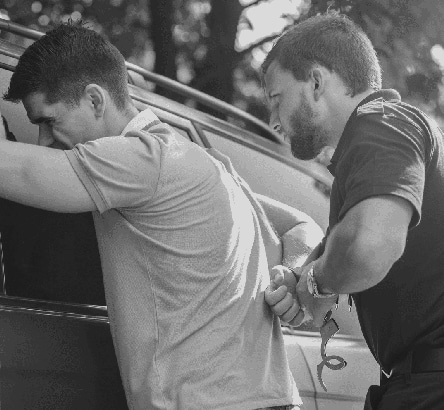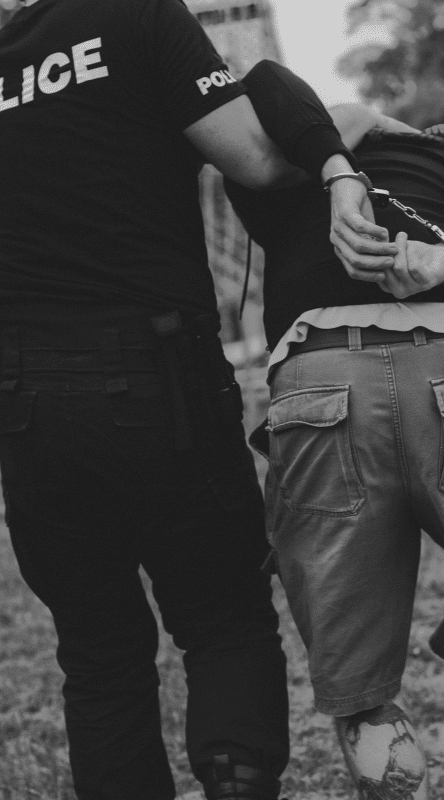What Is False Arrest?
What is a false arrest? When someone is arrested without probable cause, it’s considered a false arrest. False arrests violate your constitutional rights, and you have the right to seek justice. The Police Brutality Center can help by providing information, resources, and guidance for false arrest victims to seek the compensation they deserve.
Content Last Updated: July 2, 2024
What is a false arrest? False arrests occur when you’re unjustly detained and taken to jail. Baseless criminal charges may even be filed against you.
If you were a victim of false arrest, you have legal rights. You can seek justice and the compensation you deserve. At the Police Brutality Center, we provide resources, information, and advocacy.
What Constitutes a False Arrest?
An individual’s freedom of movement is a fundamental right. A false arrest curtails that right without just cause. A false arrest is a significant violation of your civil rights.

Understanding Reasonable Suspicion and Probable Cause
Central to the lawful execution of an arrest are two concepts: reasonable suspicion and probable cause. A false arrest occurs when these two factors are absent. Understanding these concepts will help determine if you were a victim of a false arrest.

Reasonable Suspicion
Reasonable suspicion refers to when a reasonable person would suspect that a crime was committed, is being committed, or is going to be committed. It allows an officer to stop you and briefly detain you for questioning. Examples include the following:
- Suspicious behavior
- Matching a description
- Nervous or evasive behavior
- Overheard conversation
- Unusual conduct
An officer cannot use reasonable suspicion as the basis for an arrest.
Probable Cause
Probable cause is a higher standard. It refers to when a reasonable person would believe that a crime was committed, was being committed, or is going to be committed. The officer must reasonably believe there is a crime, not just suspect it. Probable cause is the requirement that police must meet before making an arrest, conducting a search, or receiving a warrant.
Examples include the following:
- Direct observations
- Evidence from crime scenes
- Informant tips
- Admissions or confessions
- Witness statements
False Arrest by Police vs. Private Persons
When thinking of arrests, we visualize police officers. They are not the only ones who can make arrests. Private individuals, like security guards or store owners, can also make a citizen’s arrest under certain situations.
Whether by a police officer or a private individual, any arrest without valid grounds infringes upon your Fourth Amendment rights against unreasonable seizures.
How To Know if You’ve Been Falsely Arrested
When an arrest is made without probable cause, it’s considered a false arrest. Do you know how to tell if you were falsely arrested?
Recognizing the Basis of a Lawful Arrest
For an arrest to be legitimate, probable cause is needed, meaning there is a reasonable basis, grounded in evidence, to believe the person in question has committed a crime. False arrests arise if probable cause is not present.
Personal Rights During Arrest
Even during an arrest, you have certain rights. You have the right to remain silent and the right to an attorney. Authorities must recognize and respect these rights regardless of the nature of the arrest.
Recognizing false arrests hinges on understanding the legal grounds for a legitimate arrest and knowing when the arresting party deviates from these standards. Consulting with a legal expert can clarify the nature of the arrest and any potential recourse.
Signs of a False Arrest
Several indicators hint at a false arrest. Here are some common scenarios:
- Warrantless arrest
- Misuse of evidence
- Profiling
- Coerced admission
Racial profiling or other forms of profiling is a significant red flag.
Is It Illegal To Resist a False Arrest?
The idea of an arrest without just cause is unsettling. Is it legal to resist a false arrest?
In many jurisdictions, resisting arrest—whether the arrest is legitimate or not—can lead to additional charges. Resisting arrest may also cause officers or others to use force. While excessive force may be considered police brutality, some force is acceptable when someone resists arrest.
Even if one believes they are being falsely arrested, actively resisting can result in a dangerous confrontation and harm to the individual, the arresting party, or bystanders. Instead, legal experts often advise individuals to comply during the arrest.
Victims of false arrest have legal avenues to seek redress. While the impulse to resist an unjust arrest is understandable, doing so can carry significant legal and physical risks. It’s often safer to address the injustice through the legal system afterward.
Can You Sue for False Arrest?
A false arrest is a traumatic infringement on personal rights. Fortunately, the law recognizes the harm. Victims can sue the responsible parties, whether police officers or private individuals.
Qualified Immunity and False Arrest
The qualified immunity doctrine poses a significant hurdle to suing government officials, including police officers, for false arrest. This legal protection shields officers from personal liability for actions taken during their duties unless they have violated “clearly established” constitutional or statutory rights that a reasonable person would know.
This immunity can complicate litigation. It is essential to show that the arresting officer blatantly disregards your rights.

What Is the Statute of Limitations for a False Arrest Claim?
The statute of limitations is crucial when considering legal action for false arrest. This timeframe dictates how long a person has to file a lawsuit after the incident. Here are the deadlines for several states:
- Illinois: Victims must file a claim within two years of the incident date.
- New York: Individuals have one year after the incident to file.
- Maryland: Individuals have three years to take legal action.
- Missouri: Victims have five years.
Victims should consult a knowledgeable attorney to navigate these time-sensitive and often intricate legal waters.
If you are ready to file a lawsuit for false arrest, we can help. Our team has access to resources and information that can help you on your path to justice.
Filing a False Arrest Lawsuit
Cases of police brutality are not rare. In 2022, 1,097 people were fatally shot by police in the U.S. A large proportion of these individuals are black or Hispanic. These statistics illustrate the need to act against police brutality and false arrest.
Legal action for a false arrest is crucial in seeking justice and redress. While you may feel empowered to challenge the unjustified arrest, navigating the legal intricacies requires a full understanding of the law.
A civil rights lawyer can ensure your claim has merit and build a compelling case. Such lawyers specialize in defending constitutional rights and understand the nuances of false arrest lawsuits.
How To Report Police Misconduct
Addressing police misconduct is vital for justice and accountability. Knowing how to report it effectively can lead to corrective actions and foster trust between communities and the police.
Filing a Complaint
Initiate your complaint by documenting the incident thoroughly. Note the officer’s name, badge number, date, time, and incident location. Details are crucial.
Witnesses can strengthen your claim, so gather their contact information if possible. Most police departments have an Internal Affairs division to lodge complaints.
Bystander Action
As a bystander, recording false arrest incidents can be invaluable. Your footage can serve as evidence in investigations.
Support Police Reform
Advocate for structural changes. Engage with community outreach programs, attend local city council meetings, and support organizations pushing for police reform.


Seeking Justice for False Arrest
False arrests infringe on our fundamental rights and erode our trust in law enforcement. Understanding what constitutes a false arrest and the legal avenues available are key steps to ensure justice is served. Addressing false arrests contributes to a more transparent and just society.
If you have been falsely arrested, you have the right to seek justice. Our team at the Police Brutality Center offers guidance, support, and resources. We can connect you with legal help to pursue justice and the compensation you deserve.

